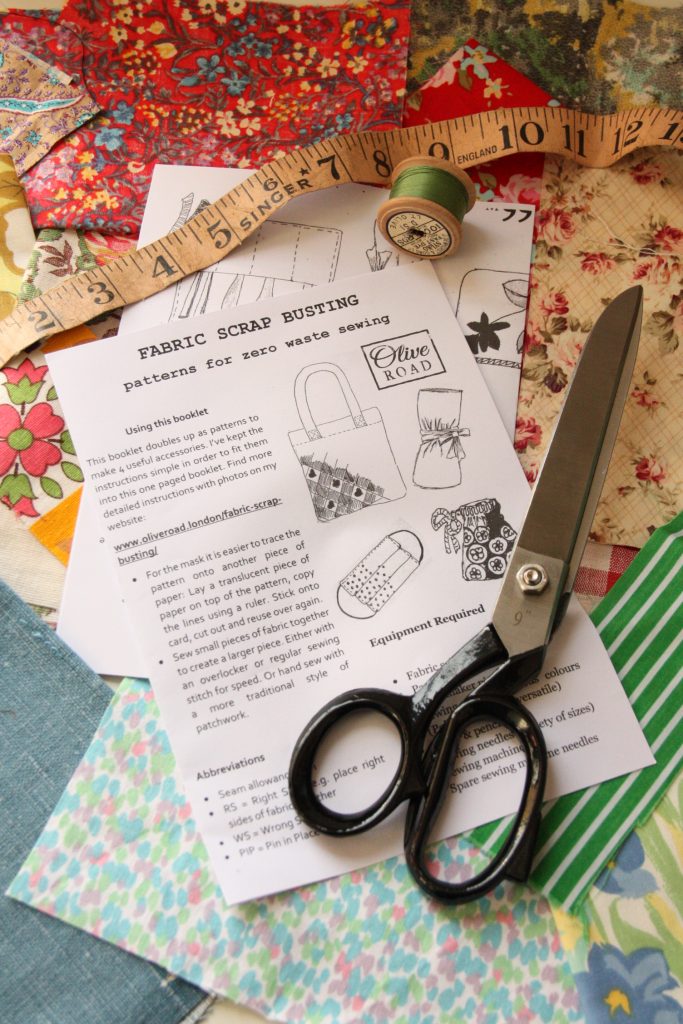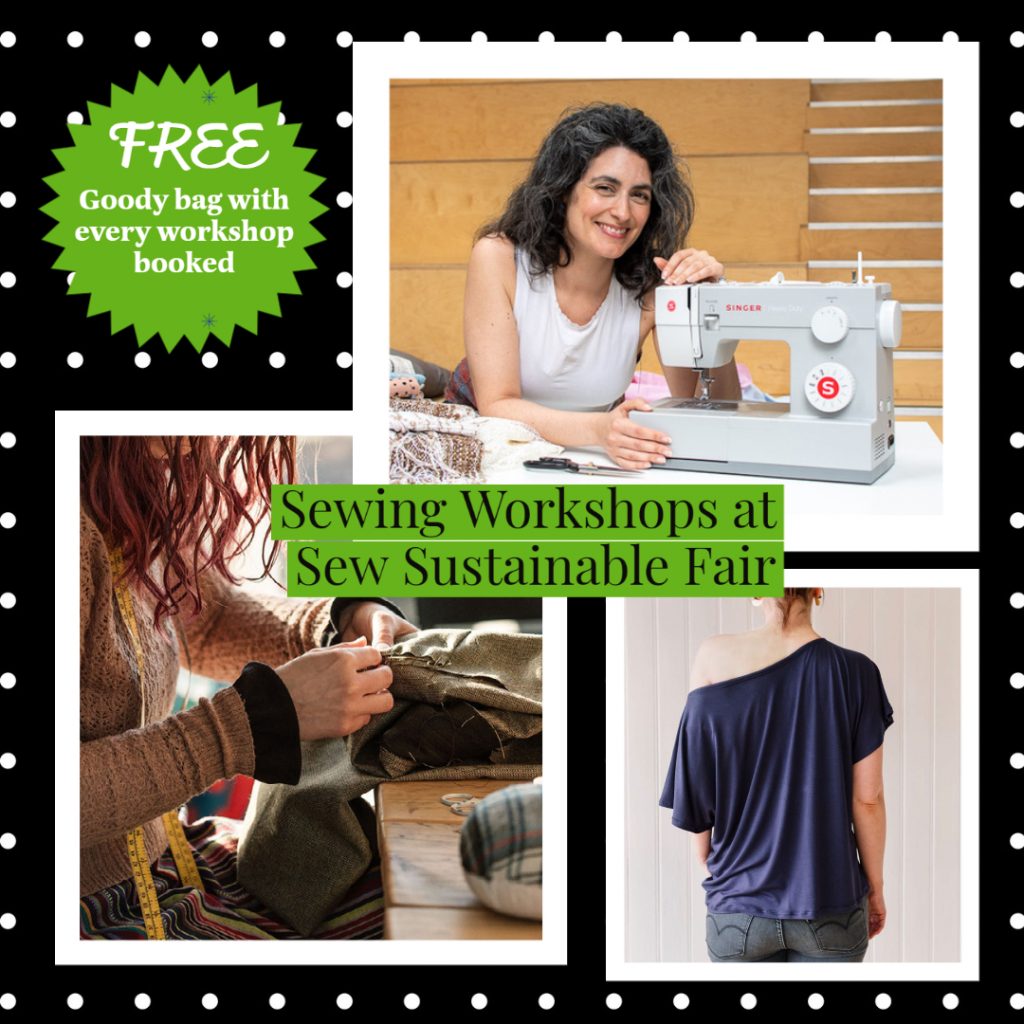Join me this Fashion Revolution Week

|
This April you have two excuses to come along to the studio: we are part of Fashion Revolution Week in the first Sew Sustainable Fair! A great opportunity to learn and create in brotherhood with our planet. Sarah, from Olive London is organizing the event. I´ll be giving this workshop mend sewing and selling lots of the iron-on patches. Hope to see you there. Book your free ticket here. Only for one day, Saturday 22nd of April from 10am to 4pm. The Forge, 397 Westferry Road, London, E14 3AE. Event´s details: Fashion Revolution Week at The Sew Sustainable Fair, LondonSaturday is Earth Day and the start of Fashion Revolution Week 2023. It is also the day of our first eco sewing event, Sew Sustainable Fair. We are taking part in Fashion Revolution Week with a pledge wall to encourage sewists to get involved. Make a pledge on any of the below sustainable sewing swaps you can make for 2023 and share on Instagram with the tag #sewsustainablefair. The nature of making our own clothes is a protest against the fast fashion industry. But have you considered who made the fabric and haberdashery? Have you swapped shopping for fashion for shopping for fabric, haberdashery and patterns? There are no judgements here, all we ask is you consider what you make and what you make it with. Even one small change in 2023 can make a difference. We will be sharing our tips on Instagram this week on the @sewsustainablefair grid and at the Sew Sustainable Fair on 22nd April at Craft Central in London’s Docklands.
Sustainable Sewing Tips1. Plan your makes Before making a new garment a good rule of thumb is to question yourself ‘will I wear it 30 times?’ A philosophy created by Livia Firth, founder of Eco-Age to help reduce the number of clothes bought and not worn. I like this explanation about the philosophy. Another question to ask is ‘Do I need it?’ Rosy Sews Modern Vintage recommends auditing our wardrobes before we start sewing. Are we making what we love to sew or what we actually wear? ‘I made myself five dresses but I walk our two dogs every morning so I tend to live in jeans and long sleeved T-shirts’ Kerry commented on the video and has now made six T-shirts. If you love listening to podcasts whilst you sew then we recommend Check Your Thread. Created by Zoe Edwards, she interviews conscious sewists. During episode 24, Zoe and Rebecca Evans-Merritt chat about planning their makes. Zoe Edwards is giving a talk with her top tips on how to sew sustainably at our fair. Sharing the processes she has learned during her 18 months of interviewing other slow sewists. The talk is free to everyone who joins us the Sew Sustainable Fair, which is also free to register via Eventbrite. Rebecca is helping us to facilitate the day, so there is chance to chat to Rebecca about her sustainable makes too! 2. Use and organise your Stash ‘I can’t buy any more fabric until I use what I have’ is a phrase I see many times on socials. We completely understand and it could even be the number one tip for sewing sustainably to use up your stash before buying more fabric. We all love looking at a well organised fabric stash (especially by colour) but the fabric was created to be used and worn and re-worn. All of the time and effort that went into growing or creating the fibres, spinning the yarn, knitting or weaving the fabric, dying and print processes, finishing processes. Plus shipping, probably many times during its journey to make it into our fabric stash. With all of that effort fabric deserves to be worn proudly and shown to the world. A bit of organisation helps. Perhaps creating a limit on the size of your storage, when it is full then it is time to use up, swap or sell. We love the Stash Hub app to help us keep track of the fabric in our stash and give us self imposed deadlines and check the status of each project. It prevents us buying more of the same when we are out shopping. Equally the app holds pattern information so we can buy what we need. Yvette and Doug from Stash Hub is also joining us as part of our shopping gallery. They will be on hand to answer any queries you may have if you already have the app or help you if you are thinking of downloading it. 3. Swap and sellWe know that sometimes we get the purchases wrong. This happens when we buy clothes and we can return them within a certain time period but usually fabric shops don’t accept returns. We might buy fabric on a whim but then decide it doesn’t suit us or any of the styles that we like to make. The Sew Sustainable Fair is being held at Craft Central in London’s Docklands, where earlier this year Olive Road London hosted a fabric swap. It was super fun with everyone bringing along a fantastic collection of fabrics that they could not use. Patterns and haberdashery included. New friends were made and we’ve already seen some of the makes from the swap. Is there a fabric swap in your area? Could you organise a smaller swap with your friends? If swapping isn’t an option then try selling on resell sites such as eBay, Etsy or Facebook market place. The North London Waste Authority have written this useful blog post on how to organise your own swap. 4. Buy vintage, pre-loved or deadstock fabric A report released in 2017 found that 73% of clothing that is thrown away by consumers goes to waste, with 57% ending up in landfill and 25% of this being incinerated. By using the fabrics that are already in circulation, it means we are not using the Earth’s precious resources to make new textiles. Buying vintage is a fun way to recycle. Saving these often bright coloured fabrics from landfill. Wondering what their story is, who owned them before us and why didn’t they use the fabric they so carefully chose? At the Sew Sustainable Fair we have a shopping gallery full of vintage and deadstock fabric from Olive Road London, Simply Vintage Designs and Missy Mop Fabrics. 5. Buy organic certified fabric Fashion Week highlights their campaigns on #whomdemyclothes and #whomademyfabric to highlight the thousands of textile workers who are not paid a fair wage and who often work in dangerous conditions. Sadly, buying vintage or swapping fabric often means we don’t know where the fabric was made. The fabric shop may know the origin of some of the process but not all of it, such as where the cotton was grown for example. Many textile workers throughout the industry are often not being paid a living wage or are working in a dangerous environment. Buying certified labelled product guarantees it is sustainable. For example, GOTS is a global standard for textiles that are made from certified organically produced raw materials and includes very strict ecological and social standards throughout the entire supply chain. You can find more information about GOTS and other sustainable labelling over on the James Tailoring website. Find James Tailoring at the Sew Sustainable Fair on the 22nd April. They will be selling their eco friendly sewing supplies. New sustainable fabric can also be found at the fair from Bornella Fabrics who will be bringing along their collection of bright fun sustainable fabrics. 6. Scrap busting We all know that scrap fabric is part and parcel of sewing. Taking up room in our already cramped sewing spaces. We don’t want to throw it away so what do we do with it? There are lots of free scrap busting ideas on Instagram and YouTube. We are giving away a goody bag to the first 50 visitors through the door of the Sew Sustainable Fair. Plus a goody bag to everyone who pays for a workshop place. Each goody bag includes scrap busting patterns from Olive Road London and Maven Patterns. Along with deadstock sewing accessories from Kleins Haberdashery and a bar of plant based chocolate from Hip Chocolate (for sewing energy of course). For those of you who can’t make the fair or miss out on the goody bag then we will send out a link for a free scrap pattern download after the fair. Send an email to sarah@oliveroad.london to be included. 7. Mending, Alterations and sewing masterclasses The clothes we make are no different to the clothes we buy in the sense that they get worn out and often need repairing. TLZ movement are teaching a workshop at the Sew Sustainable Fair to encourage us to mend and alter our clothes. Often it is the smallest repair or alteration that stops us wearing our favourite clothes. Bring along your mends or practice on samples at this fun workshop. £25 per person booking. Perhaps you are a beginner sewist and hoping to make your first garment. Carole from Seasons of East is teaching how to make a slouchy T-Shirt from the Spring in London pattern. Only four people in the class so there is lots of chance for 1:1 tuition. Or maybe you want to enhance your sewing skills. Master tailor Claire from Couchman Bespoke is teaching two workshops. One to problem shoot pattern cutting and another to give advice on draping fabrics. More details on the workshops and links to book here About Fashion Revolution Week 2023 “Fashion Revolution Week 2023 marks 10 years since the Rana Plaza tragedy. Using the 10 points of our manifesto as building blocks, our Global Network of Fashion Revolutionaries in 75 countries are bringing people together to build a vision for radical change. Find out more about the campaign and how to get involved here.” |

